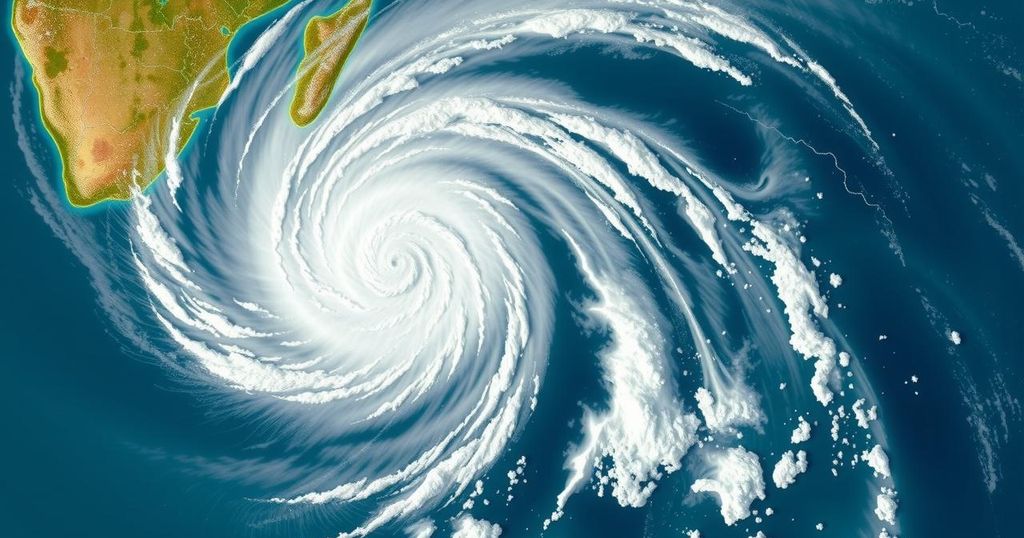Tropical Cyclone Chido: Situation Report on Impact and Health Risks in Northern Mozambique
Tropical Cyclone Chido struck northern Mozambique on December 15, 2024, causing severe destruction with heavy rains and strong winds. The hardest-hit areas include Cabo Delgado, Nampula, and Niassa provinces. Approximately 23,598 homes were destroyed, and health facilities were severely impacted. The crisis poses significant health risks due to compromised medical supplies and inadequate shelter for displaced populations. Efforts are underway to address urgent needs and facilitate recovery.
Tropical Cyclone Chido, a significant weather event, made landfall in the Mecufi district of Cabo Delgado Province, Mozambique, on December 15, 2024. The cyclone unleashed heavy rainfall reaching 250 mm within 24 hours and winds of 180 km/h. By December 16, the cyclone had moved into Malawi and was forecasted to dissipate by December 17 in Zimbabwe. The provinces of Cabo Delgado, Nampula, and Niassa have experienced the most severe impacts, with resultant heavy rains and winds causing extensive damage to infrastructure.
In Cabo Delgado Province, the districts most affected include Mecufi, Chiure, and Pemba. Preliminary assessments reveal terrifying figures: approximately 23,598 homes were completely destroyed, 149 schools affected, and 37 health facilities damaged. The destruction led to significant disruptions in electricity, water supply, and internet connectivity, presenting critical challenges for recovery efforts. Notably, Pemba airport was temporarily closed but has since reopened.
Assessments of Mecufi district indicate catastrophic infrastructure damage, with nearly all homes affected, leaving approximately 400 families homeless. The human toll has also been significant, with 50 reported injuries and 16 confirmed fatalities. Local health conditions have deteriorated, as medical professionals are operating under dire circumstances and relocated to a school due to facility failures, while essential medical supplies are compromised due to exposure. There are currently no active temporary accommodation centers, compounding health risks for those affected.
In Chiure district, 50% of homes lost their roofs and the remaining structures sustained severe destruction. Furthermore, an urgent water supply crisis has emerged in Megaruma, necessitating immediate water truck interventions for 3,000 families. The availability of health services at Chiure Rural Hospital is severely limited, with only 30% operational capacity. Despite the establishment of four accommodation centers, they remain empty as no displaced individuals are currently registered there.
The Metuge district can only be accessed via 4×4 vehicles, with extensive damages reported. Importantly, a medication warehouse and maternity facility have also suffered significant impacts. Meanwhile, in Pemba district, three accommodation centers were identified, but operationalization efforts remain insufficient to meet the demands of the displaced population.
Moreover, Pemba City faces the additional threat of urban flooding, particularly affecting vulnerable neighborhoods such as Bairro Cariaco and Paquitequete. This multifaceted crisis necessitates urgent and coordinated response efforts to address the immediate needs of affected populations while laying the groundwork for longer-term recovery.
Tropical Cyclone Chido was a powerful cyclone that struck Mozambique on December 15, 2024, causing severe destruction, particularly in the Cabo Delgado Province. The storm brought heavy rains and dangerous winds, leading to substantial infrastructural damage in multiple provinces. This report highlights the affected areas and the health implications following the cyclone’s impact, as authorities assess the scale of the disaster and address immediate humanitarian needs. The storm has prompted significant distress across the affected regions, exacerbating the pre-existing vulnerabilities within these communities.
In conclusion, Tropical Cyclone Chido has wrought significant devastation across northern Mozambique, particularly in Cabo Delgado Province. The immediate challenges include shelter, healthcare, and water supply, requiring urgent intervention by humanitarian organizations. The cumulative effects of this cyclone emphasize the need for continued support and resources to ensure recovery and resilience-building for the affected communities. As the situation develops, immediate action is essential to mitigate ongoing health risks and safeguard vulnerable populations from further harm.
Original Source: reliefweb.int




Post Comment